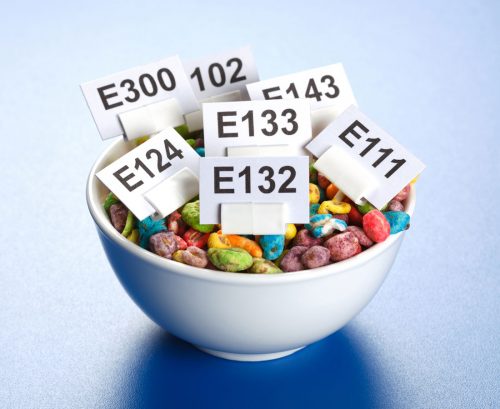
Food additives go hand in hand with processed foods — and can cause unpleasant reactions in some people. Health writer Karen Fittall reveals why — and what you can do about it.
When you hear the words ‘food’ and ‘intolerance’ or ‘allergy’ used in the same sentence, you probably think of things like gluten, lactose, or even peanuts and shellfish. And you’d be right. But additives used in food can trigger unpleasant side effects, too.
“Some people do in fact report adverse reactions when they eat foods containing certain additives,” says Lyndal Collins, research dietitian at Monash University’s Department of Gastroenterology.
Statistics suggest anywhere between 1 to 5 per cent of people react to one or more food additives. The most common reactions include respiratory problems like asthma; skin conditions such as hives, itching and swelling; digestive issues including diarrhoea; and nervous reactions like hyperactivity and insomnia.
Collins says these kinds of reactions are usually a result of a sensitivity or intolerance to the additive, which is different to a food allergy as it doesn’t involve a response by the body’s immune system. More rarely, additives can cause severe allergic reactions, including anaphylaxis — a life-threatening reaction that causes your body to go into shock.
Collins says that while it’s not clear why some people react to food additives while others don’t, people with certain medical conditions may be more likely to be affected.
“Sulphur-containing additives can trigger asthma in some asthmatics, and sugar polyol-type sweeteners may trigger gut symptoms like bloating, wind and diarrhoea in people with irritable bowel syndrome.”
What are food additives?
Additives are substances that are added to foods to help keep them fresh, or to enhance flavour, texture or colour. More than 300 food additives are approved for use in Australia, and Collins says the idea that they’re inherently ‘bad’ is false.
She says that all additives have to be registered and have their safety verified by Food Standards Australia and New Zealand before they’re approved for use by food companies in Australia.
“It’s also important to note that while some additives are artificially made in a lab, others come from natural sources,” Collins says.
In fact, substances that are commonly used as additives include vitamin C, lecithin (present in egg yolks), and MSG, which is found naturally in parmesan cheese and tomatoes.
Surprisingly, MSG occurring naturally in such foods usually appears in larger amounts than it does in foods that contain MSG as an additive.
What to do if you have a reaction to food additives
Food-additive sensitivities or intolerances are thought to be one of the drivers behind the significant increase in the popularity of ‘free-from’ foods. These are foods that are free from things that commonly spark dietary reactions, with a 2019 survey estimating the food category to be worth $7.7 billion in Australia.
Fortunately, because some additives are much more likely than others to trigger reactions, you can learn what to look for, then start reading ingredients lists and begin choosing the food products that suit your body.
Still, Collins says it’s always best to ask for advice from a dietitian if you suspect that you have any kind of food sensitivity or intolerance.
Symptoms can be caused by a wide range of unrelated factors, and eliminating some foods may have unintended nutritional consequences.
“A dietitian will assess your diet in conjunction with your symptoms and use a targeted approach to identify which foods or ingredients may be the culprit,” Collins says.
Eating minimally processed foods reduces your exposure to additives
Additives in non-food products
Additives are routinely added to products other than food, but what’s not so well known is that some of the same potentially troublesome food additives are often used.
For example, aspartame is commonly added to toothpaste to make it more palatable, while preservatives like parabens, which can cause dermatitis when they’re in contact with the skin, regularly appear in products like body lotions, shampoo, conditioner and soap.
As a result, people with paraben sensitivities are advised to avoid exposure to skincare products that contain paraben preservatives.
Additives to watch for
While some additives have been identified as being unlikely to cause adverse reactions, there are definitely some common problem-causing food additives to look out for. Keep in mind that they may be listed on the packet by name, or by number.
Glutamates
A handful of glutamates are regularly used to enhance the flavour of savoury foods. Monosodium glutamate, or MSG, is one of the most common ones. Look for the numbers 620–625.
Preservatives
These stop bugs and germs from spoiling a wide range of processed foods, including processed meats, canned fish dips and marinades. Some frequently used preservatives that may cause problems include benzoates (210–213), nitrates (249–252) and also sulphites (220–225 and 228). Very rarely, parabens such as propylparaben (216) and methylparaben (218), which are also used in a range of food products, may cause an allergic reaction when they are ingested.
Food colourings
Colourings are used today in everything from confectionery and drinks to sauces, cereals and dairy foods, and both artificial and natural varieties can cause problems. Some commonly used colourings that may trigger reactions include tartrazine (102), yellow (2G107), sunset yellow (FC110) and cochineal (120).
As with food colourings, reaction-causing sweeteners may be artificial, such as aspartame (951), or natural. Natural sweeteners are the sugar polyols that can be particularly problematic for people with irritable bowel syndrome (IBS).
Sugar polyols are often used in diet or sugar-free products. Foods that use these additives usually contain an advisory statement stating that ‘excess consumption may have a laxative effect’ — but people with IBS who consume much smaller doses may experience symptoms such as diarrhoea, bloating and wind. Sugar polyols include sorbitol (420), mannitol (421), xylitol (967) and maltitol (965).
Article sources and references
- Medical News Today. 2017. What is a food intolerance? Accessed July 2020https://www.medicalnewstoday.com/articles/263965
- ABC. 2013. The hard facts on food additives. Accessed July 2020https://www.abc.net.au/health/features/stories/2013/02/14/3684208.htm
- Better Health. 2012. Food additives. Accessed July 2020https://www.betterhealth.vic.gov.au/health/ConditionsAndTreatments/food-additives
- Women’s and Children’s Health Network. 2019. Food additives. Accessed July 2020https://www.wch.sa.gov.au/services/az/other/nutrition/documents/Food_Additives_2019.pdf
- DermNet NZ. 2003. Food additives and E numbers. Accessed July 2020https://dermnetnz.org/topics/food-additives-and-e-numbers/
- Australian Government. 2017. Australia New Zealand Food Standards Code — Schedule 8. Accessed July 2020https://www.legislation.gov.au/Details/F2017C00339
- DermNet NZ. 2002. Allergy to parabens.Accessed July 2020https://dermnetnz.org/topics/allergy-to-parabens/
- Monash University. 2016. What are the polyols? Accessed July 2020https://www.monashfodmap.com/blog/what-are-polyols/
www.healthyfood.com










